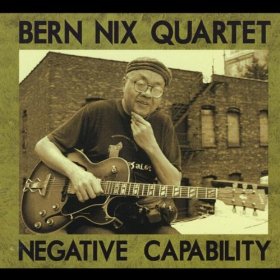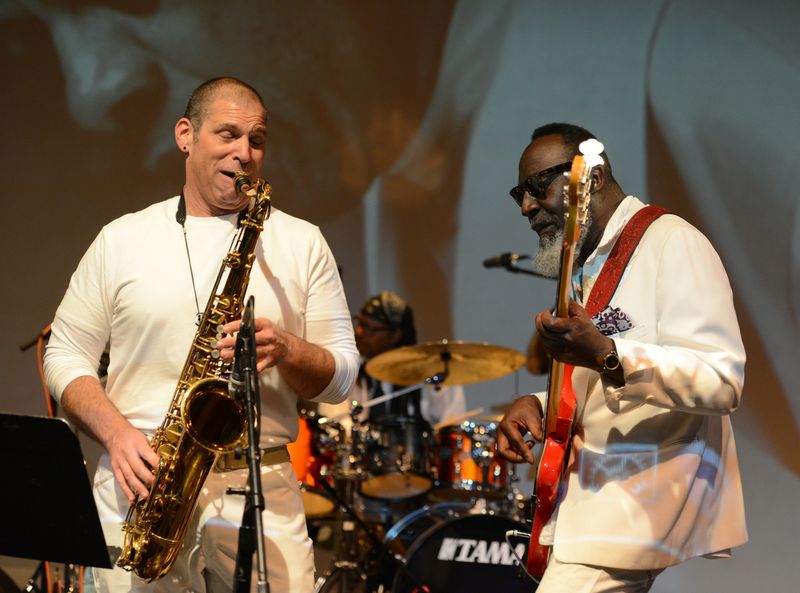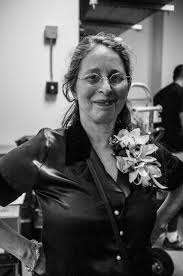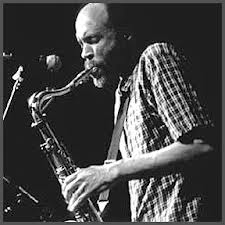Leading up to and so far during Jazz Appreciation Month, I’ve heard some stunning, challenging and engaging if not always 100%, brilliantly revelatory music that goes beyond the strictest (old) definitions of jazz. I’m just getting to post about certain performances (here’s a preview:
— having been busy with grassroots organizations and activists in 22 cities publicly celebrating local Jazz Heroes, part of the Jazz Journalists Association’s JazzApril efforts to raise media profile of jazz (broadly defined) throughout especially the USA, hoping to attract some attention from those who aren’t already into it.
My next posts will be  a photo gallery and comments on Celebrating Ornette at the Painted Bride in Philadelphia on March 21, as above — and a report on Universal Synchrony Music Volume 2, a telematic improvisation conducted by Sarah Weaver at SUNY Stonybrook connected with Stanford U and NASA’s Kepler Space Mission.
But for starters: Thanks for permission to reprint from The Wire: Adventures in Music and Sound, which assigned me to review the 11h weekly concert of the Evolving Music series, here are my comments on the ongoing and quite worthwhile project of devoted
and extremely hardworking Patricia Nicholson Parker (winner of the JJA’s Producer of the  year Award in 2003, 2007 and 2008), executive director of non-profit Arts for Art, Inc. which puts on the annual Vision festival (this coming June honoring Charles Gayle, who I profiled in The Wire in 1997).
I can recommend Evolving’s scheduled performances on Monday 4/21 featuring guitarist Kenny Wessel in drummer Lou Grassi’s “and friends” band, and saxophonist Jon Irabagon playing with pianist Luis Perdomo (in quartet, which I haven’t heard; I haven’t heard William Hooker’s trio as on the bill either, but multi-talented Matt Lavelle is playing trumpet and Mark Hennen, another interesting individualist, piano). Monday 4/28 Evolving presents Jonathan Finlayson, a young trumpeter-composer whose live playing and 2013 album Moment and the Message I’ve been enjoying, with a trio paying tribute to the late, great John Tchicai; guitarist Garrison Fewell with too-little-known reeds master Will Connell, in what’s listed as (drummer) Gerald Cleaver’s Black Host, but with drummer Reggie Nicholson (who’s been a favorite guest lecturer/demonstrated at my NYU class “The Arts: Jazz”), and saxist Yoni Kretzmer’s 2Bass Quartet.
Here’s what The Wire published, except the photos I found on the web, which unfortunately are not watermarked with the photographers’ credits.
Evolving Music: 11th week Clemente Soto Velez Cultural Center, New York, US
The very title of the Evolving Music series, a weekly showcase produced in a small theatre of a Lower East Side community centre, begs the questions: evolving from what, how, and to what ends? A Monday evening in mid-March featuring intimate improvisational groups led by guitarist Bern Nix, alto saxophonist Rob Brown and multi-instrumentalist Daniel Carter provided few answers, though each of the three performances offered listening satisfactions.
Chief among them were Nix’s spidery lines as echoed, emphasized and expanded upon by Matt Lavelle on cornet and alto clarinet; Brown and trumpeter Kenny Warren’s frontline teamwork, and Carter’s chameleon-like shifts of musical personality, as he chose to pick up his trumpet, flute, tenor or alto sax. All three ensembles, each with their own bass and drums rhythm teams, derived their approaches from Ornette Coleman’s free jazz revolution, now more than 55 years old, with key characteristics being loosely interpreted song forms, intuitive collective interplay, exploratory and unrestricted personal expression.
 Nix himself is best known as a member of Coleman’s 1970s and ’80s band Prime Time, but his quartet with Lavelle, staunch bassist Francois Grillot and light, fast drummer Reggie Sylvester has a more transparent sound than that amplified septet or octet
Nix himself is best known as a member of Coleman’s 1970s and ’80s band Prime Time, but his quartet with Lavelle, staunch bassist Francois Grillot and light, fast drummer Reggie Sylvester has a more transparent sound than that amplified septet or octet
usually projected. Bern’s recently self-released CD Negative Capability was the basis of his Evolving set, throughout which he sat facing his fellow musicians rather than the audience of 50.
With a determinedly dry, clipped guitar sound, Nix rejects grandstanding. Rather than imposing his artistry, he elicits listeners’ attentions the way a soft talker gets people to lean in for every nuance. This was offset by Lavelle’s gregarious nature, blowing his brand new horn prettily, and exploiting his alto clarinet for both its low burble and high bite.
Rob Brown and Kenny Warren, with bassist Peter Bitenc and drummer Juan P Carlletti, were altogether more aggressive. A constant in New York’s downtown scene since the early 80s, Brown has often collaborated with Matthew Shipp and/or William Parker, and developed an insistent, steely sax sound. He introduced brief motifs
in unfussy unison with Warren, then focused on de- and re-constructing their integral intervals for all imaginable possibilities. Warren worked hard to match Brown’s concentration; his forays seemed like successive stabs rather than methodical linear extrapolations. But shoulder to shoulder, the altoist and trumpeter presented a united front before supportive rhythm.
Daniel Carter is one of downtown’s most elusive figures, at once everywhere and yet somehow ephemeral. His musical persona is perhaps the least studied or self-conscious of any of his peers. He relies on impulse and inspiration, and is almost always able to catch a spark as if it were a lightning bug to be coached into beaming a steady stream of penetrating melody. Carter was particularly beguiling playing muted trumpet and flute. Drummer Ehran Elisha and bassist Jeremy Harlos accompanied him, and the three were alert to each other’s inflections.
Return, however, to the premise of Evolving Music, a project of Arts For Arts, the non-profit organisation directed by Patricia Nicholson Parker (bassist William Parker’s wife), which also produces the annual Vision Festival. Both fest and series are platforms for the once revolutionary but now questionably progressive practice of letting preconceptions go, trusting instinct above traditional forms and standards. The notion that spontaneity itself guarantees transcendence or evolutionary change ought to be examined. To the talents Evolving Music convenes, complex structures and old school virtuosity should not be limits or threats – they might lend bright ideas supportive strengths. Then what could music that’s free to tap all techniques, strategies and human capacities become? — Howard Mandel
howardmandel.com




